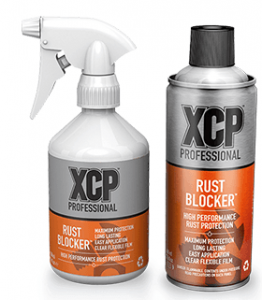 Take a look at our Facebook review of the new XCP Rust Blocker
Take a look at our Facebook review of the new XCP Rust Blocker
What sets these two products, ACF-50 and Rust Blocker, apart from the rest is they are both extremely good at what they do, and maintaining protection over an extended period. Beyond that, these are two entirely different products, which work in entirely different ways, and as you’d expect from that give different results.
Where ACF-50 goes on as an ultra thin fluid coating, XCP Rust Blocker goes on as an ultra thin slightly gel type coating. In testing we looked at four main areas, and where necessary going back to XCP’s lab testing to confirm the results.
• Application
• Retention
• Effectiveness
• Cosmetics
Application works pretty much the same as with ACF-50. If you can reach it, you can apply it, making sure you apply it lightly and wipe off any excess. One benefit of Rust Blocker we found was being a more ‘tactile’ liquid there’s very little if any dripping when you use it, useful if you over do it a bit with the spray button. With a motorbike however, there are a lot of areas you simply can’t reach without a major strip down. So we were pleasantly surprised to find Rust Blocker can also be pressure misted to deliver it deep into the bike to areas where it’s needed.
Retention is important with these products. There’s little point in them if they can be buffed or washed off easily and need constant reapplying. When we did just that with Rust Blocker we found it hard to establish if the coating was still in place We called the XCP Lab and asked them to do some additional testing to confirm what was happening to the coating. The results that came back were not what we expected. The photos show you what happened. The level of protection still being provided by Rust Blocker is really quite impressive!
For effectiveness 3-4 months really isn’t long enough to establish that, and we weren’t going to coat a bike and ride it around for two or three years to see if it rusted over. Some fairly basic testing we carried out gave some positive results, but this is were lab testing comes into it’s own.
From the photos of the lab tests it’s clear XCP Rust Blocker is out performing other coatings by a fair margin.
One thing we weren’t expecting is that Rust Blocker can also offer good protection from galvanic corrosion, where two dissimilar metals are in contact with each other, something found quite often on motorbikes. We don’t know of another retail product on the market that does that; quite an achievement.
For cosmetic appearance one of the advantages with ACF-50 is not only does it provide a high level of protection, but it also helps enhance the bikes looks. Blacks have a nice dark sheen to them, rubber and plastic trim looks revived. If applied properly is also rare for road dirt to stick to it, so it stays looking good for longer.
XCP Rust Blocker doesn’t work quite the same, as we said it’s an entirely different product which works in a different way by forming a surface barrier. Even several days after application if you run your fingers over it you’ll feel resistance, it’s not smooth and glossy. For the majority of applications this wouldn’t be an issue. But on bikes we found road dirt thrown up does tend to stick, reducing the overall appearance of the bike. That said, there are going to be a lot of bikers for whom a slight loss of looks is going to be greatly outweighed by the higher level of protection!
It also doesn’t ‘soak’ into or enhance rubbers and plastics such as handlebar grips and switchgear so you’d probably want to avoid applying to those. Although it won’t hurt these surfaces in any way, getting it on your gloves then using them to wipe away rain or bugs. can leave smearing on the visor.
It can be buffed up, and as we’ve seen from the tests doing so still retains a high level of protection compared to other products. But doing that around engine fins, linkages and the numerous other nooks and crannies around a bike is going to be fairly impractical unless you want to devote some serious time and energy to it.
On the plus side any dirt accumulation can be removed with a good wash down, again without seriously diminishing the coatings protection.
So… is ACF-50 now redundant? actually we don’t think so. From what we’ve seen Rust Blocker certainly performs as advertised in the majority of applications. Our own testing and the lab results indicate that Rust Blocker has brought corrosion protection technology bang up into the 21st century. Motorbikes by their very design, build and use have always been a bit of an odd one when it comes to products for use on them, but our overall opinion is that there’s a place in that market for both ACF-50 and XCP Rust Blocker……BUT you’ll now have a choice to which is best suited to the needs of your biking.
Riders who want their bike to look it’s best while still having a high level of protection year round would probably opt for ACF-50 treatment. ACF-50 remains a world leader in corrosion protection and can make a significant difference to the condition of a bike.
Those who want a higher level of protection because the conditions or area it’s exposed too give a greater risk from corrosion, (near sea spray, industrial fallout, roadside parking or even long term storage), may find XCP Rust Blocker the preferred option.
